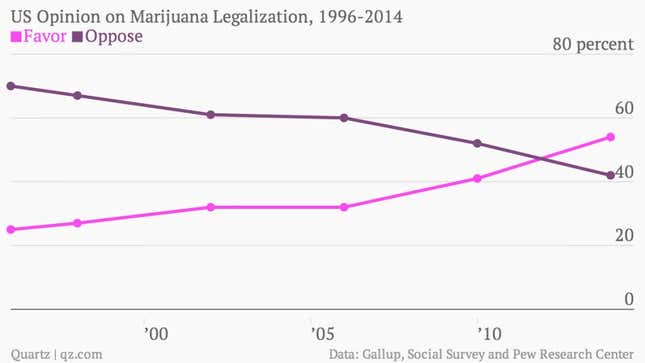This was arguably the biggest year ever for the global marijuana policy reform movement.
In the US, voters in Alaska, Oregon and Washington, DC, joined Washington state and Colorado in legalizing marijuana for recreational use. In Uruguay, authorities began implementation of a landmark marijuana law and inspired neighbors to re-think drug policy. Brazil, Argentina, Chile and Ecuador this year began congressional debate on legalization or de-criminalization of marijuana for medical and recreational use.
“The movement made major gains,” says Mason Tvert, a spokesman for the Marijuana Policy Project, the largest organization working solely on marijuana policy reform in the United States. “And I think it tells you something that many of those who have propelled us to victories are young people.”
Shifting perceptions
Public opinion and political action have not always moved in lock-step on this issue. In Uruguay, for example, almost two in three Uruguayans want the marijuana law repealed.
In the US, however, marijuana legalization is supported by a bare majority—51%—of Americans and by 64% of those aged 18 to 34. But political support has lagged. To date, only one US senator has publicly endorsed marijuana legalization.

Is marijuana the next big tobacco?
Politicians are wary of openly supporting legalization of a drug that can have adverse public health consequences, says Kevin Sabet, director of the anti-legalization group Smart Approaches to Marijuana (SAM) and a former senior adviser on drug policy in the Obama administration. “We are creating what is essentially the next big tobacco industry of our time,” Sabet tells Quartz.
Legalization is indeed driving a new marijuana industry in Colorado, where from January to May of this year, marijuana sales brought the state roughly $23.6 million in revenue from taxes, licenses and fees. And, that number is likely to substantially increase in the coming years, according to a July report by the Brookings Institute.
“Colorado has shown that when you have good governance, institutional support across all levels of the state’s bureaucracy, and a solid and well-executed implementation program, marijuana legalization is not only possible but has a chance to be incredibly beneficial to the state’s coffers,” John Hudak, author of the Brookings report, tells Quartz.
But Sabet sees Colorado’s windfall differently: ”Contrary to how advocates paint it,” he says, “this isn’t an issue about civil rights or civil liberties. It’s about mass commercialization of a drug for profit.”
A civil rights issue
An estimated 750,000 people, disproportionately people of color, are jailed in the US each year for marijuana-related offenses, according to the American Civil Liberties Union (ACLU). For that reason, the National Association for the Advancement of Colored People (NAACP) has called marijuana legalization a civil rights issue.
This year, the NAACP supported Initiative 71 in Washington, DC, which would legalize the possession of marijuana for adults over 21 years of age and allow individuals to grow up to six plants in their home. The bill easily passed last month.
In a January profile in the New Yorker magazine, President Obama was candid on the civil rights issue. He told editor David Remnick that middle-class kids “don’t get locked up for smoking pot” and those who do are predominantly poor African-Americans and Latinos who are “less likely to have the resources and the support to avoid unduly harsh penalties.”
Turning the political tide
In May, in a sign that the mood on Capitol Hill may be slowly changing, the US House of Representatives passed a spending bill that forbids the Drug Enforcement Agency (DEA) from funding efforts to conduct medical marijuana raids in states (23 in total and the District of Columbia) where it is legal.
The move followed the US Justice Department’s Cole Memo (pdf), addressed to federal prosecutors and signed by Deputy Attorney General James M. Cole in August 2013 that made it clear that states would be allowed to move forward with establishing their own marijuana policy.
For his part, US Attorney General Eric Holder says he’s “cautiously optimistic” on legal weed.
Looking ahead to 2016
Although 2014 was, perhaps, the most important in decades for the marijuana legalization movement, 2016 is expected to be more significant.
At least five US states—Arizona, California, Maine, Massachusetts and Nevada—will hold ballot initiatives for marijuana legalization that year.
The fight for California, the country’s most populous state, is expected to be the “game changer” that advocates hope will finally launch their movement from the fringes of American society to the American political and cultural mainstream. Some argue it’s already there.
One thing is certain: Whatever happens in two years’ time, the gains made in 2014 have set the foundation for what could become an unstoppable political and economic force in the US and abroad in the coming years.




